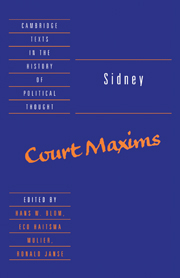Book contents
- Frontmatter
- Contents
- Preface
- Note on the text
- Introduction
- Principal events in Sidney's life
- Bibliographical note
- Biographical notes
- Court Maxims
- First Dialogue
- Second Dialogue
- Third Dialogue
- Fourth Dialogue
- Fifth Dialogue
- Sixth Dialogue
- Seventh Dialogue
- Eighth Dialogue
- Ninth Dialogue
- Tenth Dialogue
- Eleventh Dialogue
- Twelfth Dialogue
- Thirteenth Dialogue
- Fourteenth Dialogue
- Fifteenth Dialogue
- Index of biblical quotations
- Index of proper names
- Index of subjects
- Cambridge Texts in the History of Political Thought
Eleventh Dialogue
Published online by Cambridge University Press: 05 June 2012
- Frontmatter
- Contents
- Preface
- Note on the text
- Introduction
- Principal events in Sidney's life
- Bibliographical note
- Biographical notes
- Court Maxims
- First Dialogue
- Second Dialogue
- Third Dialogue
- Fourth Dialogue
- Fifth Dialogue
- Sixth Dialogue
- Seventh Dialogue
- Eighth Dialogue
- Ninth Dialogue
- Tenth Dialogue
- Eleventh Dialogue
- Twelfth Dialogue
- Thirteenth Dialogue
- Fourteenth Dialogue
- Fifteenth Dialogue
- Index of biblical quotations
- Index of proper names
- Index of subjects
- Cambridge Texts in the History of Political Thought
Summary
Tenth Court Maxim: What advantages the Court may draw from Spain and Holland or the United Provinces
Philalethes: there is such a perpetual contrariety between the interests of Spain and France, that he that unites with France *must break with Spain*: It is easy to know how he should proceed with Spain as to the public. But courtiers may contrive that some hold correspondence with one, some with the other, that they may have constant pay and presents from both.
Eunomius: England never had in the least any dependence on France or on any other power, since England, Spain, France, and | the best part of the known world was emancipated by the dissolution of the Roman empire. The interest of every nation that cannot pretend to a universal monarchy or more limited superiority over its neighbours, is to keep any others from attaining it and maintain its own freedom and independency on any for protection, as it is best for any private man that cannot hope to be king to endeavour there shall be none. Freedom is the greatest advantage next to dominion. He that cannot command, ought to endeavour to preserve himself from being commanded. If he cannot gain power over others, to retain that over himself. England cannot pretend to such hopes of a universal monarchy as France and Spain have long contended for.
- Type
- Chapter
- Information
- Sidney: Court Maxims , pp. 155 - 160Publisher: Cambridge University PressPrint publication year: 1996



